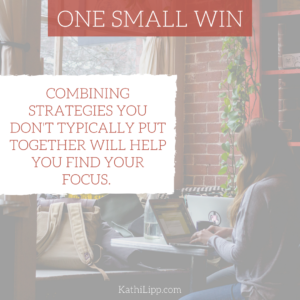
by Guest Blogger | Jun 19, 2017 | Guest Blog, Me |

I’ve got to get focused on this project.
I set down my pen.
What usually works isn’t working right now.
I lean back in my chair.
And that’s okay.
I exhale.
This situation is different.
Several major projects are all due at the same time, and every single one is now or never.
I could say “no” to some of them.
Honestly, though, I don’t want to. I don’t want to miss out on any of these exciting opportunities.
I want to move forward with every single one.
But how?
When You Just Can’t Find Your Focus
Maybe you’ve been in a similar situation: You’re trying to make progress, but your brain can’t focus because it’s going in a dozen different directions at the same time.
In my situation, I had pushed myself to do the work—even though I really wanted to do anything but this type of work in the moment.
I went through all the usual techniques that typically help me focus:
- I took a walk.
- I turned off all distractions.
- I set a timer.
But all of my fail-safe strategies failed.
The harder I tried, the muddier my mind became. I couldn’t make myself make progress.
Or even get started.
Which was crazy. These were projects I really wanted to accomplish, and I was grateful for the opportunities.
At the same time, they were demanding tasks for me. Each project involved writing. And not just ordinary writing, but the most challenging kind of writing where every word mattered.
I needed a new strategy.
What Made the Difference
Here’s what worked for me:
- I used pen-and-paper, which forced me to slow down.
- I limited my work to what would fit on one page, which narrowed my focus.
- I quickly skipped over anything that wasn’t the best fit, which gave me momentum.
- I saved ill-fitting ideas for later projects, which kept me from getting bogged down.
What made the difference?
My mind stayed focused on one task at a time without getting distracted by “Shiny Object Syndrome.”
This may be a challenge for you, too.
Combining strategies you don’t typically put together will help you find your focus.
How to find what helps you focus
Learning to combine old strategies in new ways is a valuable skill.
You already do this in the kitchen when you tweak a recipe — trying a little of this, a little of that, until the flavors blend together just so.
Here’s how to combine strategies to help you quickly find focus:
1) Make a list of the typical strategies that help you focus.
(For ideas, download your free “5 Simple Ways to Quickly Find Your Focus” checklist.)
2) Check any strategies that usually work for you.
3) Circle any new strategies that intrigue you.
4) Combine several different strategies into a new “recipe.”
5) Now, experiment with it.
How will you know that you’ve found the right combination of strategies?
You’ll start to feel unstuck. You’ll get going again.
As you gain momentum, you’ll make great progress.
All because you finally found your focus.

Question: What’s one strategy that helps you find your focus?
 Mary Lou Caskey trains Christian coaches and communicators to influence hearts through the power of story. If you want to become a transformative storyteller, connect with Mary Lou and get her free quiz, “Is It the Best Time to Share a Personal Story?”
Mary Lou Caskey trains Christian coaches and communicators to influence hearts through the power of story. If you want to become a transformative storyteller, connect with Mary Lou and get her free quiz, “Is It the Best Time to Share a Personal Story?”

by Glynnis Whitwer | Jun 14, 2017 | Clutter Free, Guest Blog |

Do you feel mental overload? Do you wonder if you’ll ever get your home or office organized? Maybe you think if you just work overtime, or if your kids could stay at Grandma’s for a week, you could finally get it together.
What if I told you working harder or having a child-free home isn’t the solution?
I’ll venture to say 75% or more of our clutter problems aren’t because we don’t work hard enough, or that our homes are too small or our children are messy. Most of our problems start because we can’t think through what needs to be done. We can’t get our minds under control. We can’t make decisions. We are on mental overload.
Do you know that feeling?
How to deal with mental overload
For years, I lived with an ongoing sense that I should be doing something all the time. It ate at me. Even when I focused on something important, there was a latent unease about what else I should be doing. It was an underlying anxiety that hung around, even when there was no pressing deadline or responsibility.
It caused stress and lack of sleep.
It wasn’t until I read David Allen’s book, Getting Things Done, that I discovered a reason for this tension. It seems our brains aren’t designed to store and manage all of the information, deadlines and demands that swirl around us at all times.
Allen writes, “The big problem is that your mind keeps reminding you of things when you can’t do anything about them. It has no sense of past or future. That means that as soon as you tell yourself that you need to do something, and store it in your RAM (your mind), there’s a part of you that thinks you should be doing that something all the time.”
It was a head-slapping moment when I read those words. That was it! Allen goes on to explain that the first step to finding a solution is to get everything out of your mind and store it somewhere safe. Not the “safe” place you stored an important document at home, and now can’t find. But somewhere close at hand.
The right to-do list
I realized my mind tried to manage more stuff than it could hold. One to-do list wasn’t the answer because it wasn’t keeping things in safe places.
With that in mind, I’m going to ask you to do something painful. Not as painful as stepping on a scale, but close. I want you to take a personal assessment of all your responsibilities, projects, priorities and tasks. Everything. Get it out of your mind and onto one document. This could be a paper notebook or digital file, it doesn’t matter. If you have multiple to-do lists, combine them into this one list. Leave this list where you can see it morning, noon and night for a few days.
On this list write down everything you need to get done. You might start with your home and add repairs, cleaning projects or laundry.
Put down things you need to do for your family, such as make a dentist appointment, write a letter to a teacher or take clothes to the dry cleaning.
Then move on to other areas of your life: church, community involvement, sports teams, etc. Include big projects and little things, like errands and emails that need to be sent. Nothing is too small to include.
You might want to dedicate one page for future projects, such as planning this summer’s vacation or researching colleges with your daughter. Another page might contain things you want to do years from now, but you don’t want to forget.
This process will take you days. If it helps, you can organize this list however you see fit if it helps you remember things. Or just write things down as they come to mind. Whatever works for you.
It’s okay if there is no order to it. Actually trying to organize it now might hinder you if you are a perfectionist. You might not leave yourself enough room in a certain category and then you’ll be frustrated.
For now, capture it all. Don’t be surprised if you feel a bit panicky at how much you have to do. Just take a deep breath and ask for God’s peace.
I promise you feel a sense of relief soon because finally, maybe for the first time in your life, you have everything in one place.
There are many things you can do with this master list. You can organize it in to tasks (one action) and projects (more than one action). You can organize it by area of your life or deadlines. You can sort it by things that need to be done today, this week, next month, in six months, etc.
Hold on to that list. Add to it. Next month, I’ll share how to create a project management planner.

Related Resources:
If you enjoyed this article, you might enjoy Glynnis’ 15-Minute Morning Refuel.
Today, decide where you will create your master list and list five action items on it to help you deal with your mental overload.

by kathilipp | Jun 7, 2017 | Clutter Free |

We’ve been flinging clutter left and right this year. Between our Clutter Free Bible Study during Lent and the Spring Fling we just wrapped up in May, I’ve noticed a few things.
First, you are all a bunch of rock stars. Fling 200 things in 10 days? Piece of cake. Our Facebook group is overflowing with the most astonishing before-and-after photos of your successes. I’m thrilled to see not just what you’ve done in your homes, but also the freedom you gained from flinging the stuff that no longer brings you joy.
Here’s what else I’ve noticed. Life doesn’t stop just because you’ve decided to gain control over this area of your life. Stuff keeps coming in the house – sometimes faster than you can release it – and it doesn’t always belong to you. If other people live in your home, their stuff can pose an even bigger challenge than your own.
How to eliminate 1,000 things in 5-weeks!
So here’s the deal. We are Clutter Free because we love a good challenge, and we work best when we’re under the gun. Starting June 12 and ending July 14, we’re hosting a Five-Week Fling to help you eliminate 1,000 things from your home. Gone for good.
Here’s how it works:
1. Over five weeks (weekends off to rest or catch up), we’re going to work together to eliminate 40 things a day from various parts of your home.
2. In our private Facebook group, you’ll share your victories and progress photos, and get accountability, encouragement and support every step of the way.
3. To participate, just make sure you are signed up to receive our blog, and then join our Facebook group.
So let’s see, only five weeks and 1,000 things out of your house? What a great way to launch your summer.
Won’t you join our Five-Week Fling? Your house will thank you.
Join the Spring Fling Now!

by Guest Blogger | May 29, 2017 | Guest Blog |

But all things should be done decently and in order.” 1 Corinthians 14:40
Ever felt frustrated or overwhelmed in your work efforts due to clutter around you?
You tell yourself you will get to it . . . eventually.
You don’t have time to declutter because your workload is pressing in on you.
Frustration turns into condemnation, so now working is made more difficult by the mental energy you must utilize just to do work. Deadlines are missed. Papers cannot be found. And the demands of life around you make it seemingly impossible to focus.
Clutter-Free Work
I get it. As a mom of five in a crazy busy life, sometimes I have felt like managing all the work around me, along with everyone else’s work (because moms are evidently supposed to manage everything), is overwhelming.
Our work environment matters.
Like a hamster, we keep running on our wheel thinking our work will be different, but the cluttered area surrounding us keeps us hampered and confined.
We could do so much more, but we continue to operate in the same manner, hoping we will still get the work done. Sounds kind of like that definition of insanity . . . doing the same thing over and over again and expecting different results.
Seems like a hopeless situation. But the very thing we tell ourselves we can’t make the time to do will actually give us the space to be able to work in a more effective manner.
We accomplish more when we have space and organization to work.
There is a misconception behind work clutter that needs to be debunked. It is not necessarily the amount of work that is the problem – it is how we work that does.
I have found that having more responsibilities requires me to be more organized. When every task has its place in space and time in my life, then I am not overwhelmed by tasks that seem to be too much.
Creating a clutter-free work zone is done physically, mentally and spiritually.
Physically
- What is it that is in our space that we don’t regularly use for work? Is there a space in our home where we can do some of our work that frees us up to think? Perhaps taking a laptop and working on the back porch for some projects will rejuvenate our vision for work and not make you feel trapped in between 4 walls.
- Maybe shelving units or a closet can also store work items (not thrown in the closet – too many skeletons in there) so we do not feel encumbered or stressed by a lot of “stuff” around us.
Mentally
- Utilizing tools like Evernote to track “to do’s” that infringe on brain capacity takes the mental energy out of busy work lives.
- We don’t have to allow our “to do” list to rule us. Make changes as needed.
- Having a specific time for projects frees us up to do the work at hand, knowing we have time to do the other projects, too.
Spiritually
- God is a God of order and having structure glorifies Him. When we are not hindered by our environment, we are better able to glorify God in our work and all we do.
Maybe it is the work itself that you dread. This article on The Hope in Work is motivation to keep pressing on in the work God has given us to do. Every task matters when it is offered as service to the King of kings.
Ultimately, we determine where and when we will work. Let the truth behind this power free you to set up your work space in the way that works best for you. Doing so will increase your productivity and help you to create a place in which God can use you mightily. Don’t have time to do it, you say? You don’t have time not to.
Look up from your work and around your work space and take five minutes each day to make your space more enjoyable to work in. What distracts you in your work space? How can you be creative with the space you have allocated?
 Denise Pass is an author, speaker and CCM worship leader from Fredericksburg, VA, where she lives with her amazing husband and 5 children. Denise is passionate about writing devotions and music that foster unshakable hope and healing in the face of seemingly insurmountable circumstances. Her ministry umbrella, Seeing Deep in a Shallow World seeks to be a compass grounded in Scripture and a place where real problems meet real, transparent faith and needed answers in Scripture.
Denise Pass is an author, speaker and CCM worship leader from Fredericksburg, VA, where she lives with her amazing husband and 5 children. Denise is passionate about writing devotions and music that foster unshakable hope and healing in the face of seemingly insurmountable circumstances. Her ministry umbrella, Seeing Deep in a Shallow World seeks to be a compass grounded in Scripture and a place where real problems meet real, transparent faith and needed answers in Scripture.
You can read more about Denise’s ministry, read and hear her talks, blog and original music over at www.denisepass.com or connect with her on Facebook and Twitter.

by Clutter Free Academy Team | May 17, 2017 | Overwhelmed, tips and ideas |
Organization for taxes
Did tax season almost make you lose your marbles … again?! Unfortunately, it’s only eight months until it will be time to start thinking about taxes again. If you find organization for taxes, it can make a stressful and overwhelming experience, easier to handle.
After struggling for years, Amy Carroll has two simple systems that have saved her sanity during tax season, and she shares one as a free download. Next year really can be better!

 Mary Lou Caskey trains Christian coaches and communicators to influence hearts through the power of story. If you want to become a transformative storyteller, connect with Mary Lou and get her free quiz, “Is It the Best Time to Share a Personal Story?”
Mary Lou Caskey trains Christian coaches and communicators to influence hearts through the power of story. If you want to become a transformative storyteller, connect with Mary Lou and get her free quiz, “Is It the Best Time to Share a Personal Story?”




 Denise Pass is an author, speaker and CCM worship leader from Fredericksburg, VA, where she lives with her amazing husband and 5 children. Denise is passionate about writing devotions and music that foster unshakable hope and healing in the face of seemingly insurmountable circumstances. Her ministry umbrella, Seeing Deep in a Shallow World seeks to be a compass grounded in Scripture and a place where real problems meet real, transparent faith and needed answers in Scripture.
Denise Pass is an author, speaker and CCM worship leader from Fredericksburg, VA, where she lives with her amazing husband and 5 children. Denise is passionate about writing devotions and music that foster unshakable hope and healing in the face of seemingly insurmountable circumstances. Her ministry umbrella, Seeing Deep in a Shallow World seeks to be a compass grounded in Scripture and a place where real problems meet real, transparent faith and needed answers in Scripture.




